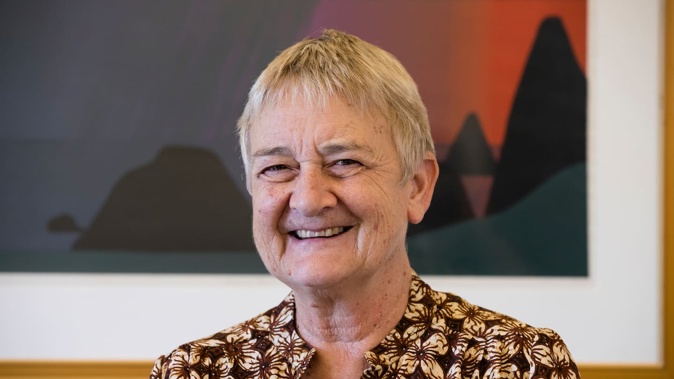
Former National MP Marilyn Waring is assembling a line-up of former MPs to form their own “people’s select committee” to hear “the evidence Parliament should have heard” on recent pay equity changes.
Panel members will include former Labour MPs Nanaia Mahuta and Lianne Dalziel, former National MPs Jackie Blue, Jo Hayes and Belinda Vernon, and former Green MP Sue Bradford.
Without warning, Act minister Brooke van Velden announced reforms of a 2020 law establishing a regime to allow people in sectors with a large female workforce to argue that they were underpaid relative to similar work done in sectors dominated by men.
The changes, passed under urgency, prompted protesters to gather outside parliament in the following days holding signs reading “we need equal pay” and “fight like a girl”.
 Pay equity protesters on Budget Day, May 22, 2025. Photo / Marty Melville
Pay equity protesters on Budget Day, May 22, 2025. Photo / Marty Melville
Waring said the unofficial but rigorous committee would investigate evidence through public submissions, official information requests and Parliament’s library instead of “high flying cliches.”
The committee would accept submissions until the end of July and produce a report by the end of the year.
“We have definitely friends inside Parliament who will lodge questions for us if we can’t get the information any other way. We are a group of rigorous researchers,” Waring said.
“I think the thing that affects me most as a former member of Parliament and as a policy researcher is watching the House make changes to legislation on something that significant ... and there not [being] evidence before the House on which to make those changes.”
Anonymity would be offered to submitters who required it. Waring said she expected information from the public and private sector to be supplied anonymously.
“I just have a lot of difficulty as a researcher in seeing pieces of legislation of such magnitude passed without evidence before the House.“
The Herald previously confirmed with the Ministry of Business, Innovation and Employment that there was no regulatory impact statement for the changes because of the tight timeframe.
 Workplace Relations Minister Brooke van Velden. Photo / Mark Mitchell
Workplace Relations Minister Brooke van Velden. Photo / Mark Mitchell
All 33 current claims would cease and those claimants would need to reapply under the new regime. Waring said those claimants would be invited to submit to the people’s committee.
Opponents to the Government’s pay equity changes say it will make it harder for women in female-dominated industries to make a claim.
But the Government has argued changes were necessary to ensure the workability of the regime, suggesting it was difficult to judge whether differences in groups’ pay were down to sex-based discrimination or other market factors.
In announcing the changes, van Velden said it was clear the current act was not working as intended while amendments made by the previous Labour Government had “created issues”.
“Claims have been able to progress without strong evidence of undervaluation and there have been very broad claims where it is difficult to tell whether differences in pay are due to sex-based discrimination or other factors.”
She said the “new and improved” system would “provide greater confidence that genuine pay equity issues will be correctly identified and addressed.”
Claims that meet the new threshold are still expected to be eventually settled – though that may take years - but the total amount of money paid out in settlements will be smaller.
 Protesters rally outside Minister Brooke van Velden’s electorate office in St John, Auckland, opposing the Government’s pay equity legislation. Photo / Jason Dorday
Protesters rally outside Minister Brooke van Velden’s electorate office in St John, Auckland, opposing the Government’s pay equity legislation. Photo / Jason Dorday
A key question surrounding the changes and bubbling away in the minds of analysts in the lead up to Budget 2025 was how much money the Government would save through its tightening-up of the pay equity scheme and changes to how the Government approached the funded sector.
On Thursday, Budget 2025 revealed $12.8b previously set aside over the forecast period had been returned.
“Significant Budget savings have resulted from fixing Labour’s flawed pay-equity regime and removing an assumption that the Government would fully fund potential settlements involving non-Government employers,” Finance Minister Nicola Willis said in a statement.
Julia Gabel is a Wellington-based political reporter. She joined the Herald in 2020 and has most recently focused on data journalism.
Take your Radio, Podcasts and Music with you









